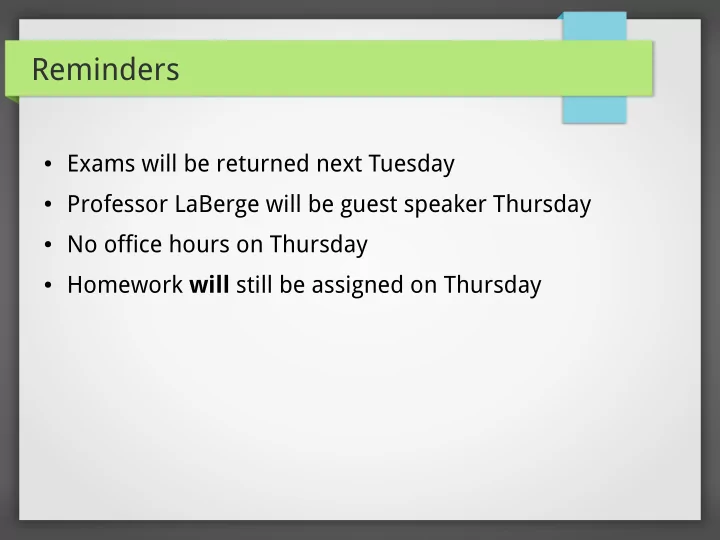

Reminders ● Exams will be returned next Tuesday ● Professor LaBerge will be guest speaker Thursday ● No office hours on Thursday ● Homework will still be assigned on Thursday
CMSC 203: Lecture 11 Algorithms and Complexity
Algorithms ● An algorithm is a procedure that follows a (finite) sequence of steps that solves a problem – Also includes mathematical / computational model ● Searching, sorting, min, max, transpose, etc. ● Algorithms may be written in psuedocode – Mix of English and traditional programming
Properties of Algorithms ● Input : Input must be a set ● Output : Input must map to a set ● Definiteness : Steps of algorithms must be precise ● Correctness : Should produce correct input → output ● Finiteness : Should output in finite steps ● Effectiveness : Each step must be finite time ● Generality : Applicable for all problems of desired form
Searching Algorithms ● Finding element in ordered list – Given element x in list A , return index of element or 0 if element is not in the list ● Linear search – Compares x to A element-by-element ● Binary search – Works if monotonically increasing – Based on subdividing search space
Sorting Algorithms ● Ordering elements of a list – Monotonically increasing / decreasing ● Many different kinds of sorts – Each solves a distinct problem – There is no such thing as a free lunch ● Bubble sort – Compare elements next to each other and swap ● Insertion sort – “Inserts” each element into correct sorted order
Greedy Algorithms ● Used to solve optimization problems – Minimize / maximize some parameter ● Greedy algorithms take the “best” choice at each step ● Can prove algorithm is optimal, or show nonoptimal counter example – Generally proven using proof by contradiction
Halting Problem ● Given a computer program as input, determine if the program will eventually stop ● Proof by contradiction shows it is impossible – By Alan Turing – Also created the definition of a Turing Machine ● This proves that not every problem may be programmed ● Also proves that finding an infinite loop is NP-Hard
Complexity ● We want to know how efficient an algorithm is – Number of steps algorithm takes and how long each step takes – Amount of memory used by each algorithm ● Two forms of analysis – Empirical analysis : Actual runtime – Asymptotic analysis : “Growth Function”
Asymptotic Analysis ● Estimate for how many operations are performed ● Can't do run-time or steps in an algorithm – Differences in hardware and software ● We want to compare algorithms while ignoring constant multipliers and smaller order terms
Big-O ● Big-O notation is used to make these estimates – Interested in algorithm as input size increases – Compare efficiency of two algorithms ● Provides an “upper-bound” for the algorithm ● Given two functions f(x) and g(x), we say that f(x) is O(g(x)) if: c,k such that |f(x)| ≤ c|g(x)| for all x > k ∃ – g(x) is an upper bound for f(x) for all x > k ● Proven using constructive proof
Recommend
More recommend